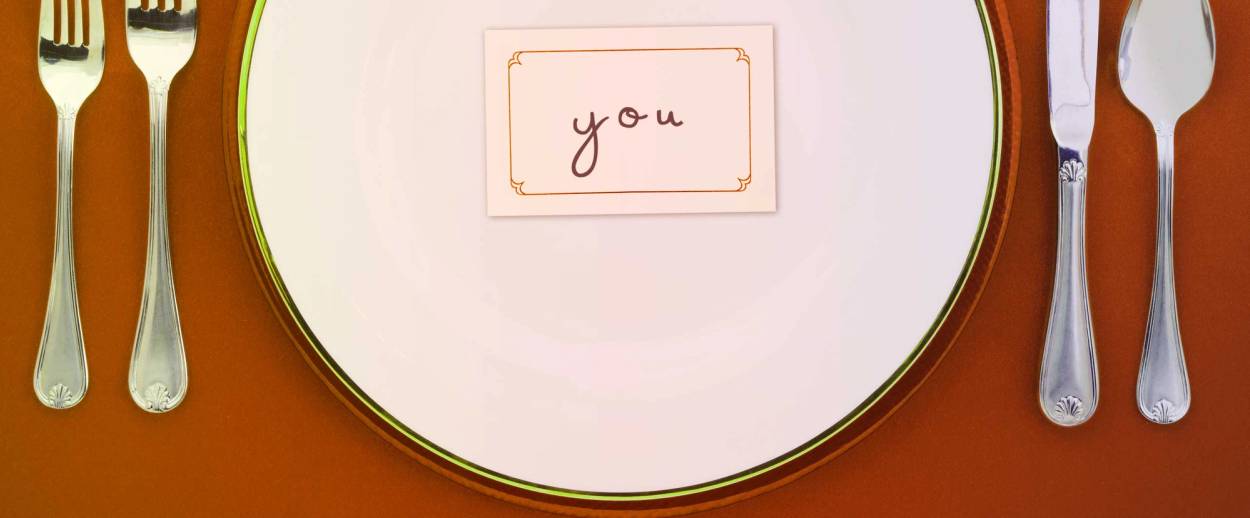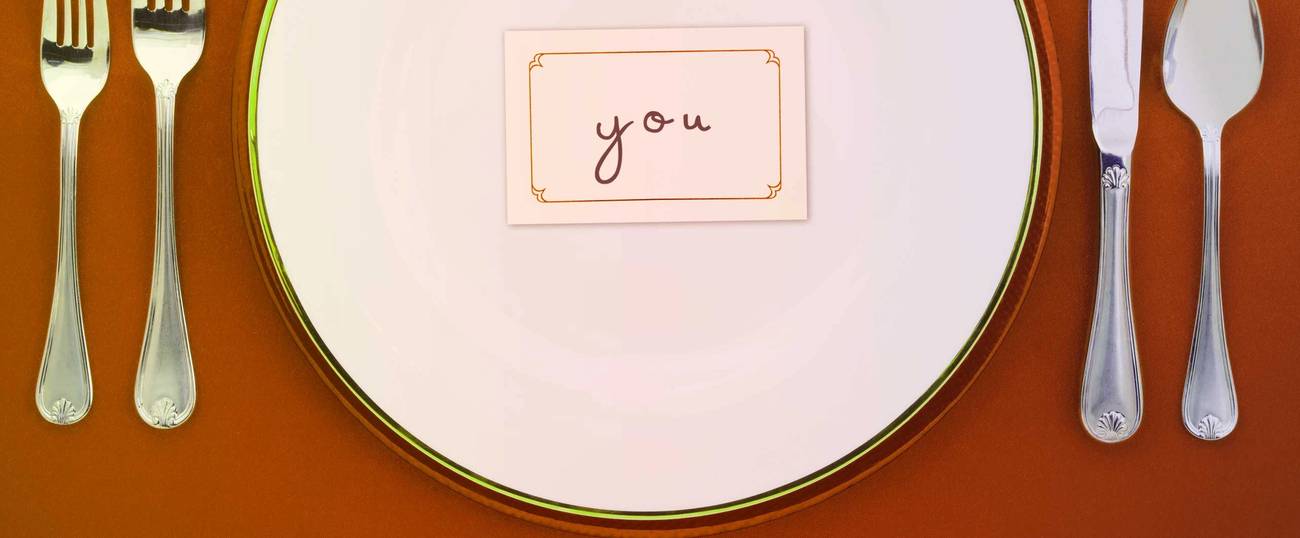When Friedman Met Friedman
A small coincidence let us start a conversation over Thanksgiving dinner. We’ve been together ever since.




When I showed up at my friend Michael’s house for Thanksgiving dinner and asked if he had a man for me, I was only half-curious. It had been barely a year since I’d broken up with my partner of seven years, and there were enough cute guys in San Francisco to provide plenty of no-strings fun.
Michael thought for a second, then said, “Maybe.”
I followed him through the garage, past the garden with its woks repurposed as fish ponds and birdbaths, to his orchid-filled cottage, where a group of people were already seated around the table. One of the guests was the guy Michael had in mind for me: a fair-haired Mormon flight attendant. But I don’t think we exchanged more than hellos, because seated at the table was a different guest who came with a built-in conversation starter: He was also a Friedman.
Jeffrey was handsome, with curly salt-and-pepper hair, older than I was—and he’d come with a man he introduced as his “creative partner.” Just before the meal began, the creative partner moved across the table from Jeffrey, thereby opening up the seat next to him. I’d never heard the term “creative partner” before, and I didn’t want to seem uncool by asking what it meant. They worked together, that much I understood; but I figured Jeffrey was taken.
Once the possibility of romance was foreclosed in my mind, I felt relaxed enough to pursue a truly interesting subject: the travails of being a Friedman in Northern California. Having established we were both East Coast transplants, we got into it immediately.
“Another Jeffrey Friedman lives on a different block of my street,” he told me.
“Doesn’t surprise me,” I said.
“And the mailman is always delivering our mail to the wrong house,” he said.
“Naturally,” I replied, then told him how at my company, I received Jennifer Friedman’s email. (This was years before my subsequent employer hired another Jason Friedman, whose principal task his first months on the job seemed to be forwarding me my email.) “What about how people out here pronounce it fried-man?” I said, and he nodded wearily. The subject of our shared name took us through the soup course.
The next afternoon Jeffrey clarified that his “creative partner” was not, in fact, his partner partner, and we started dating soon after.
***
Nobody could get over that we had the same name. I didn’t think it was any big deal, Friedman being such a common Jewish name. But even the Jews we encountered—including the ones raised in New York, where the phonebook is basically a binder of Friedmans—were surprised by the coincidence. Soon I started pointing out that not only were we both Friedmans, we were both J. Friedmans as well.
We dined out on our common last name. Occasionally one of us might say, “We took each other’s name.” Or “We were considering hyphenation.” We smiled brightly whenever the subject of monogrammed towels came up.
But even as our friends seemed surprised at the coincidence of our sharing a last name—what are the odds? they seemed to be saying—I was never so amazed by it. At first, I thought it might be because our meeting seemed so inevitable, that nothing about it, not even our name, seemed like a crapshoot. We had Michael and another friend or two in common. We shared so many interests that we could easily have met in a bookstore, in standing room at the opera, at the symphony, or at any number of bars.
Jeffrey speculated where our paths might have crossed before we were so respectably introduced at Thanksgiving dinner. I’d spent a summer in San Francisco in 1984: I came out on a Trailways bus and worked as a houseboy for a male couple who lived in a Victorian in the Castro, the neighborhood where Jeffrey was living at the time. Turns out we hung out at the same café. Worked out at the same place. Might even have shared that gym’s hot tub, which looked out over the city and was pretty cruisy during the day. Might we even have, you know, hooked up and forgotten about it?
In the end, we agreed we wouldn’t have gotten together back then. We were different people, looking for different things. Just a year before we met, we were both still getting out of other relationships and not looking to start another one. It wasn’t, in fact, inevitable that we found ourselves in the right place at the right time to want to know each other more deeply. Maybe I was unimpressed by the coincidence of our shared name because it paled in comparison to a much greater coincidence: that we got together at all.
Michael’s Thanksgiving dinner was in 1998, and Jeffrey and I have been together and explaining our name ever since. From the start people just assumed one of us had taken the other’s name. My old friends whom I hadn’t seen in a long time thought Jeffrey had taken mine; his old friends thought the reverse. Strangers who met us assumed that our shared last name meant we were brothers—a less threatening relationship, I suppose, than homosexual lovers—even though there’s a 12-year age gap between us, and we don’t look much alike.
My mother embraced the idea that Jeffrey and I might be related, though only in the sense that she understands all Jews to be related. She likes to point out to strangers that I’m the only one of her three children who married a Jew, her Henny Youngman delivery underscoring the irony that it was the gay kid who married within the faith.
In early summer 2008—that sweet season after the California Supreme Court declared marriage bans unconstitutional but before voters amended the state constitution to bar gay marriage—we applied for a marriage license, went to City Hall, and waited. A string quartet was playing in the central hall, grooms in white three-piecers strode arm in arm, brides clutched bouquets and one another, heels clicking on the gleaming floor. City Hall was one big wedding party—everywhere, that is, except at our window, where the young woman reviewing our application frowned.
“I’m sorry,” she finally said, “but relatives cannot get married to each other.”
“We aren’t related,” Jeffrey explained.
The clerk seemed unsure.
“Friedman is like the most common Jewish name,” I said, adding, “I promise we won’t reproduce.”
But the clerk didn’t seem willing to take this on faith, and suddenly this predicament didn’t seem so funny anymore.
“You’ve never married people with the same name before?” I asked.
She shook her head. “You are the first couple I’ve ever married,” she said.
Seemingly like the rest of the building’s staff, she had been deputized to handle all the pent-up demand. The joy on these city workers’ faces appeared to exceed that of the couples themselves, whose own happiness was at times tempered with jitters.
I was so moved to be part of the clerk’s virgin marriage that I started to cry. Jeffrey squeezed one of my hands, and with the other I fished out my handkerchief.
“Sorry,” she said. “Sorry.”
“It’s not you!” I said. “We’re sorry to be giving you such a hard time.”
The party raged around us but we were at a standstill. “Wait here,” the clerk finally said.
When she came back, she had another woman in tow, her manager, who studied our application. Then she took out a pen. Whatever she did—scribble “NOT RELATED” and her initials on it?—worked.
“Congratulations,” the manager said. “Mr. and Mr. Friedman.”
Jason K. Friedman won the Mary McCarthy Prize in Short Fiction and the Anne and Robert Cowan Writers Award for Fire Year.